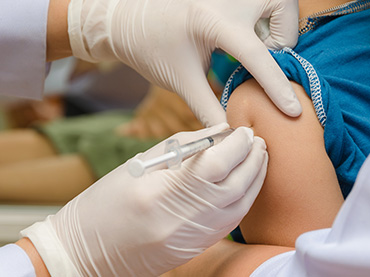- Sections :
- Crime & Public Safety
- Restaurants & Food
- Sports
- More
Immunizations have high importance as students get ready to go back to school

THE WOODLANDS, Texas – Despite the continuous sunny rays and heat, the summer's end is finally upon students and it is finally the time to jump back into the backpacks and head out to the bus for the 2014 – 2015 school year. As parents and students sadly pack away their bathing suits, acknowledging the priority and importance to be properly vaccinated stays highly imperative for parents in keeping children disease and illness free.
Summertime is an opportunity for many families and children to escape their typical routine’s and make memories traveling, visiting relatives, participating in camps, ‘chilling’ at the pool, etc. But once these children are all back into a unified building after weeks of adventures and experiences, there is no telling what germs they will bring along and expose to their peers.
“Unvaccinated children have higher chances at contracting severe diseases than vaccinated peers headed back to school,” said Rose Lapis M.D., F.A.A.P at the Texas Children’s Pediatrics of The Woodlands.
Children and adults not being vaccinated is also allowing for mass return of many once eradicated diseases like measles and whooping cough. Events like these occur because many parents have never seen the severe resurgence of these diseases as when they were discovered and first treated, like the once viral nerve attacking and paralyzing disease, polio. By being proactive with our health and keeping up with vaccinations, we will keep ancient and new strains from the virus from ever emerging. Thankfully our growing degree of pharmaceutical medicines and technology has enabled us to detect, treat and manage these illnesses.
Doctors agree that hand washing is the single most efficient way to prevent any unwanted germs and illnesses, but sending a child to elementary school or high school without the backup insurance of a vaccine multiplies their chances of severe illness, missing school and exposing the virus to family and friends.
The student population continually grows locally in schools and universities, with laws now requiring a mandatory Meningococcal vaccine for the prevention of Meningitis. The serious illness results in an infection of the brain and spinal cord, and often death if not treated. Educators have deemed it necessary to prevent an immobilizing virus with a high risk of casualty from effecting its students and teachers, allowing parents to rest that one disease has been stopped, but what about the others? At the age of 11, children receive the Tdap vaccine prohibiting the intake of bacteria causing coughing, difficulties breathing, possible rib damage as well as painful muscle stiffness all over the body. HPV (Human Papillomavirus) is the most commonly sexually transmitted virus in the U.S. with roughly 20 million Americans infected causing cervical cancer and sexually transmitted diseases. The HPV vaccine is optional, but recommended to be given at 11 years of age for both males and females who may be exposed to sexual contact in their later young adult years. Another very commonly known vaccine every individual, with very few exceptions, should receive is the Influenza vaccine. The flu vaccine should be available for vaccination in most clinics as early as late August. The Flu virus usually spreads by coughing, sneezing and close contact between individuals in the months of October through May. The highest risk of contracting this disease is among children and the elderly whose immune systems are not as strong. Thousands of people in the United States die from the flu each year. Viruses like these change strains and mutate as medicine fights back, that’s why becoming immunized yearly from even the most common illnesses like the Flu, may save those close to you from infection, hospitalization, or worse, death.
Thankfully our community has many outlets for vaccinating yourself and your child this school year like the Walgreens Healthcare Clinics and pharmacies, CVS pharmacies and MinuteClinic’s and H.E.B.s’ RediClinic and pharmacy whose certified nurse practitioners and pharmacists are available throughout the week for fast and friendly service for greater convenience. Delaying immunizations puts children at risk at a sensitive age where it is the most recommended to be vaccinated because the viruses can be more harmful and severe. Side effects of these immunizations are also very typical: mild soreness, redness, aches or fatigue shortly after shot is administered.
“Scientific data proves that major reactions to these vaccines is rare and after several decades of studies, many patients receive no day-to-day interrupting effects other than the ordinary,” said Walgreens Pharmacist, Elaine Puckett.
“It all boils down to getting to know your doctor and pharmacist who are there to help the people in the community live long and healthy lives,” said Puckett.
If parents have questions or concern’s regarding these back-to-school immunizations, scientifically sound websites such as The United States Center for Disease Control and Prevention, The U.S. Food and Drug Administration and The American Academy of Pediatrics Childhood Immunization Support Program are ideal resources regarding vaccines and illness prevention.

















